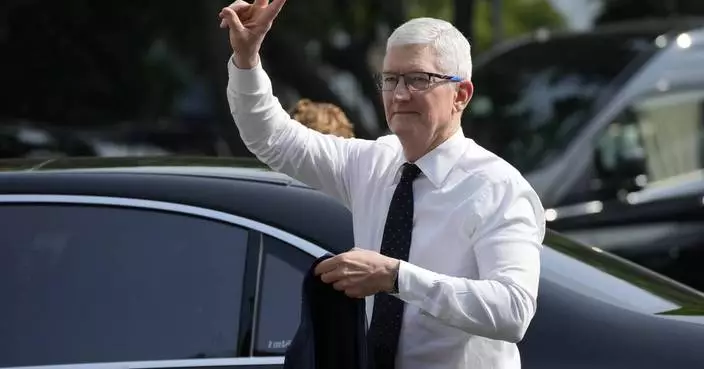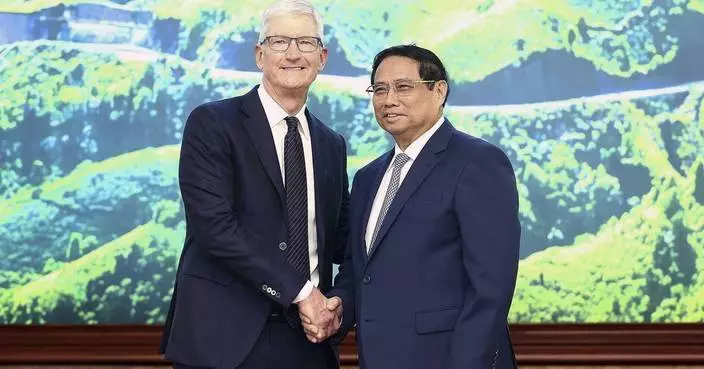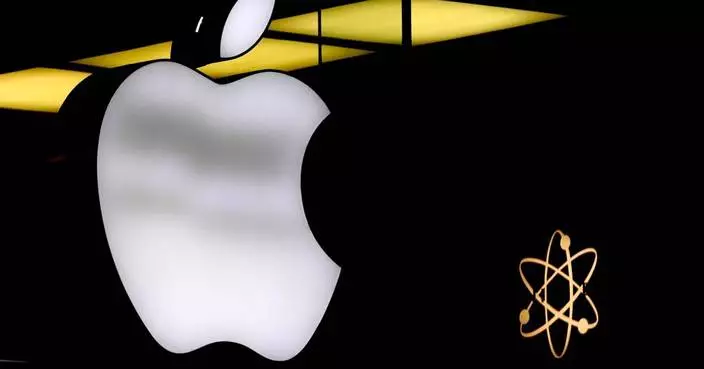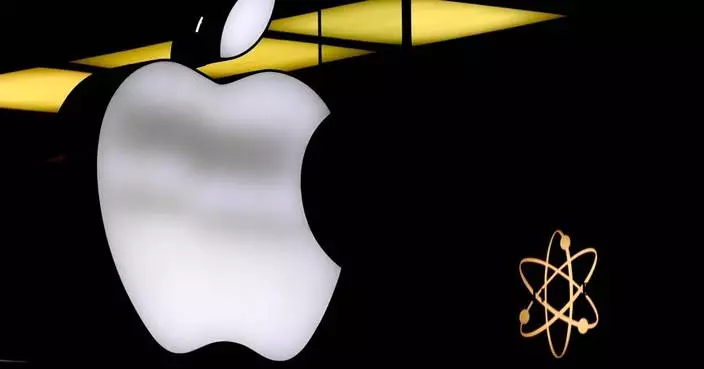In mid-September, Apple unveiled its new Face ID facial recognition system , which is due to debut with the iPhone X on Nov. 3. The system lets users unlock their phones just by glancing at them, but has also raised privacy questions and some anxieties over whether someone could force you to unlock your phone by pointing it at your face.
On Wednesday, Apple offered some in-depth explanations about the pains it's taking to protect your privacy in an update to its website.
Here's what you need to know about how Face ID works and the precautions Apple has taken for privacy and security.
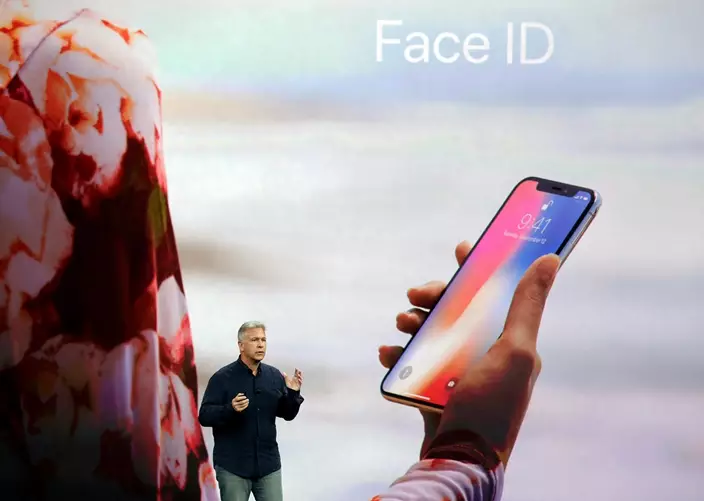
FILE - In this Tuesday, Sept. 12, 2017, file photo, Phil Schiller, Apple's senior vice president of worldwide marketing, announces features of the new iPhone X, including Face ID, at the Steve Jobs Theater on the new Apple campus, in Cupertino, Calif. (AP Photo/Marcio Jose Sanchez, File)
HOW DOES FACE ID WORK?
Face ID captures both a 3-D and 2-D image of your face using infrared light while you're looking straight at the camera. Apple then compares that information to images you took while setting up Face ID; that comparison is done using a "neural network" that lives on the iPhone X's new A11 chip.
Five unsuccessful attempts at Face ID will force you to enter a passcode — which you'll need anyway just to set up facial recognition. That requires you to come up with a secure string of digits — or, for extra security, a string of letters and numbers — to protect your privacy.
DOES IT WORK?
It didn't during Apple's Sept. 12 event — at least initially, when senior vice president Craig Federighi tried and failed to demonstrate Face ID for the crowd before switching phones. Apple explained that handlers mistakenly set off Face ID attempts prior to Federighi's presentation, which caused the phone to revert to a passcode lock before he took the stage.
While Face ID won't face an acid test with ordinary users until November, Apple says it should work just fine.
IS APPLE GOING TO STORE MY FACE IN THE CLOUD?
Relax, Apple says. Your face isn't leaving your device.
The iPhone X will store representations of your face in its "secure enclave," a hardware-based enclosure designed to be resistant to spying and tampering. The phone-based neural net processing means the image representations never have to go anywhere.
The iPhone X allows does allow third-party apps to let you sign in via Face ID, but these outside developers only receive notifications from Apple that you've been authenticated or not. Other apps "can't access Face ID or the data associated with the enrolled face," the company said in its security white paper.
The only time your images can leave the phone is when you call Apple's support service, AppleCare. If you're having trouble with Face ID, you can select which images you want to send for diagnostics, the company said.
CAN A BORDER GUARD/JEALOUS SPOUSE/TRAFFIC COP UNLOCK MY PHONE BY POINTING IT AT ME?
Maybe — although Face ID only works if you're looking at it. So turning away is one emergency measure you could take.
Apple has also provided a panic button feature. Simultaneously squeeze the iPhone X's power button and either volume button for two seconds, and it will temporarily disable Face ID by turning the phone off. Just as with Touch ID, the phone requires a passcode after a restart. The process essentially turns your phone into a brick for anyone who doesn't know your passcode.
SUPPOSE I SHAVE MY HEAD OR GROW A BEARD? WILL MY PHONE STILL KNOW ME?
Apple says its algorithms learn to adapt to appearance changes over time. The system keeps recent images and uses them to allow unlocking if they are close enough to the registered image.
But if you undergo a sudden changes in appearance — like shaving a beard, for instance — the phone will only add the new image to its library if you follow a failed Face ID attempt by immediately entering your passcode.
CAPE TOWN, South Africa (AP) — Congo ’s government is questioning Apple about the tech company’s knowledge of “blood minerals” from a conflict zone in the African country that could be smuggled into its supply chains and is demanding answers within three weeks.
A group of international lawyers representing Congo said Thursday that they sent letters to Apple’s CEO Tim Cook and its French subsidiary this week, raising concerns about human rights violations involving the minerals extracted from mines in the country’s troubled east that might end up being used in the company’s products.
They included a list of questions challenging Apple to show how it monitors its supply chains in a region where more than 100 armed rebel groups operate, some of whom have been accused of carrying out mass killings of civilians.
Writing to Cook, the lawyers said “it has become clear to us that year after year, Apple has sold technology made with minerals sourced from a region whose population is being devastated by grave violations of human rights.”
"The iPhones, Mac computers and accessories that Apple sells to its customers around the world rely on supply chains that are too opaque, and that are tainted by the blood of the Congolese people," the lawyers said.
Eastern Congo is one of the most mineral-rich regions in the world but is also the site of a huge humanitarian disaster, with the armed groups fighting for years for control of the mines and the valuable minerals in them, and millions of people displaced and affected by the worsening violence. The situation has deteriorated badly in the last few months.
Apple’s press representatives in Europe didn’t respond to a request for comment.
Apple, which has a market value of around $2.6 trillion, has denied using minerals from mines and regions where human rights violations take place and says it conducts business ethically. It said in a 2023 report that it “responsibly” sources minerals in Congo and its neighboring countries.
The minerals it buys don't finance war or armed groups, it says. The lawyers for the Congo government said “those claims do not appear to be based on concrete, verifiable evidence.”
The Congo government said it has suspicions that some of the tin, tungsten, tantalum and gold — known as the 3TG critical minerals — that Apple sources from suppliers is smuggled out of Congo to neighboring Rwanda and then infiltrated into the global supply chain. The 3TG minerals are key components in electronics.
“In Congo, people have been dying for 30 years as a result of illegal mining,” Congo government spokesperson Patrick Muyaya said. “We want clarification on the sources of supply for major technology companies, in particular Apple, to verify whether they are acquiring minerals produced in completely illegal conditions.”
He said Rwanda “is presented” as the supplier for many of the minerals while having few reserves of its own.
Congo has accused Rwanda of financing and directing the notorious armed rebel group M23 in eastern Congo to help extract minerals illegally. The United Nations also says M23 is backed by Rwanda.
Rwanda denies that but tensions between the countries are increasingly high, while M23 and other groups are accused of regularly carrying out attacks that include the killing and raping of civilians, according to Human Rights Watch.
The lawyers for the Congo government quoted a 2022 report by the nongovernmental organization Global Witness that claimed Apple had previously applied “few meaningful mitigation measures” to avoid using smuggled minerals.
The Congo government was now seeking “effective redress” against “end-users of blood minerals” across the world, the lawyers said.
They asked Apple to respond to questions over its supply chain controls within three weeks and said they had compiled a report on “the laundering” of Congo's minerals by Rwanda and private entities that would be made public this month.
They also would seek instructions from the Congo government as to what legal measures it is considering against Apple, the letter said.
AP Business Writer Kelvin Chan in London and AP writer Saleh Mwanamilongo in Kinshasa, Congo, contributed to this report.
AP Africa news: https://apnews.com/hub/africa

FILE - A Congolese miner sifts through ground rocks to separate out the cassiterite, the main ore that's processed into tin, in the town of Nyabibwe, eastern Congo, Aug. 16, 2012. Congo’s government is questioning Apple about the tech company’s knowledge of “blood minerals” from a conflict zone in the African country that could be smuggled into supply chains. A group of international lawyers representing Congo said Thursday, April 25, 2024, that it sent letters to Apple’s CEO Tim Cook and its French subsidiary this week raising concerns about human rights violations involving the minerals extracted from mines in the country’s war-torn east. (AP Photo/Marc Hofer, File)





